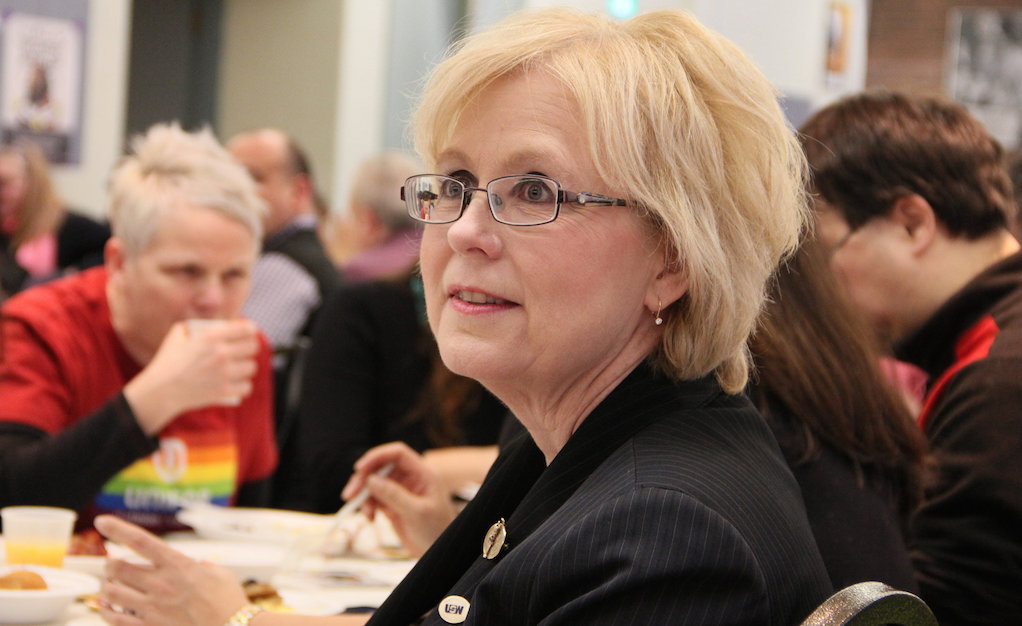Proposed changes to Ontario’s employment laws don’t do enough to support workers who are experiencing domestic violence, says Peggy Sattler, the member of provincial parliament fighting for domestic violence leave to be included in Ontario’s labour laws.
The government revealed their amendments to the Employment Standards Act last week. These include allowing employees to take time off for personal emergency leave if they or a family member are experiencing sexual or domestic violence, or have the threat of domestic or sexual violence.
The proposed legislation allows all Ontario employees up to 10 days of personal leave each year, the first two of which are to be paid.
Right now, only employees at businesses with more than 50 employees are guaranteed 10 days of personal emergency leave. None are paid. Employees can use these days if they or a family member is sick, or if they or their family member has an emergency. Experiencing domestic or sexual violence, or the threat of this violence, is not currently listed as a separate reason for taking the leave.
In Alberta, legislation that would give workers up to 10 days of unpaid domestic violence leave received royal assent on Wednesday. Workers are eligible if they or a dependent child or protected adult living with them is experiencing domestic violence. Employees must have worked for an employer for 90 consecutive days to qualify for this leave.
“While these new laws won’t end domestic violence on their own, they’re going to help,” Gil McGowan, president of the Alberta Federation of Labour (AFL), said in a statement to rabble.ca on Wednesday. Many people stay in dangerous situations because they can’t afford to leave, McGowan said, so fear of losing their job makes “an already tough financial situation an impossible one.”
This makes Alberta the second province to guarantee domestic violence leave. Manitoba became the first last year. Employees in Manitoba are entitled to 10 days of leave, five of which are paid. They are also entitled to up to 17 weeks of continuous leave. A private member’s bill was introduced in Saskatchewan in March that would allow workers access to the same leave as in Manitoba. Similar legislation has been proposed in British Columbia.
Establishing a separate category for domestic violence in Ontario is “a baby step forward,” said Sattler, MPP for London West. She introduced a bill last September that would allow employees up to 10 days of paid leave a year if they are experiencing domestic or sexual violence. They can use the time to move, meet with lawyers or attend court or see a doctor or counsellor. The bill passed second reading in October.
If adopted, the bill she proposed would create a separate leave for domestic or sexual violence that’s in addition to personal emergency leave already provided. It also includes provisions for employers to accommodate workers who are experiencing domestic violence by changing their schedules or location of work. It mandates all managers, supervisors and employees to be trained about domestic violence.
The proposed two days of paid leave is a “far cry” from her proposed 10 paid days, or the five paid days guaranteed in Manitoba for workers in domestic violence situations, Sattler said.
The United Steelworkers (USW), in a press release responding to the Ontario government’s labour law proposals, also called for a longer, paid leave for people leaving violent domestic relationships.
The union has been negotiating leave for domestic violence into more contracts. At their international conference earlier this year, it announced domestic violence leave language should automatically be part of all negotiations.
It can be a tough sell for some employers to agree to domestic violence leave, especially if it’s paid. Employers have to pay for both the employee on leave and their replacement, said Lynne Descary, a USW staff representative who is responsible for negotiating more than 30 agreements. She began introducing domestic violence leave into contracts last year, and it’s her goal to have it in all of them. She got domestic violence leave included in five of the seven contracts she negotiated in 2016.
She negotiated her first contract with paid domestic violence leave this year. It was for four weeks.
Domestic violence leave should be paid because of how severe the situations are, said Descary. Even if people have a job, sometimes their abusers take their money away from them. Guaranteeing an income is “one less power struggle with the abuser,” she said.
It’s important for domestic violence leave to be included in contracts because governments change. Once it’s in the collective bargaining agreement, “I know it’s secure and I know that it’s there,” said Descary. “I don’t need to worry about what political party is at the helm.”
In 2012, domestic violence leave was guaranteed in The Yukon Teachers’ Association contract. Employees can take up to five paid days for domestic violence leave. Supervisors can decide to grant more if needed. Domestic violence leave is also guaranteed in the contract for government of Yukon employees. The contract says leaves for domestic violence reasons cannot be denied.
A 2014 study from the Canadian Labour Congress and researchers at Western University in London found that a third of respondents had experienced domestic violence. Of those, more than half said they’d experienced it at or near their workplaces. The Newfoundland and Labrador Federation of Labour (NLFL) has been researching the issue and is preparing a report to present to the government in the fall. Mary Shortall, president of the federation, told rabble.ca in April that she is “very optimistic” the province will pass domestic violence leave.
NLFL domestic violence project researcher Alyse Stuart told rabble.ca at the time that unpaid leave really isn’t an option. “It’s paid or bust.”
Meagan Gillmore is rabble.ca’s labour reporter.
Photo of Peggy Sattler via United Steelworkers/flickr




